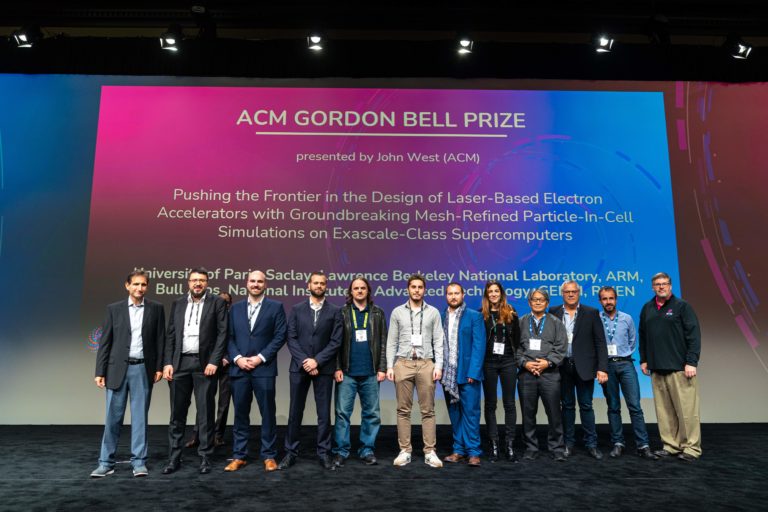A research team led by Jean-Luc Vay, a senior scientist and the head of Berkeley Lab’s Accelerator Modeling Program (AMP) in the Accelerator Technology and Applied Physics (ATAP) Division, and their international collaborators were honored with the Association for Computing Machinery’s (ACM) 2022 Gordon Bell Prize for their work on a first-of-kind mesh-refined (MR) massively parallel Particle-in-Cell (PIC) code for kinetic plasma simulations on exascale-class supercomputers.
Vay’s team – which includes Axel Huebl and Remi Lehe from AMP, Andrew Myers and Weiqun Zhang from Berkeley Lab’s Applied Mathematics & Computational Research Division, and Kevin Gott from NERSC – collaborated with a team led by Henri Vincenti, physicist and head of the Theory and Modelling Physics Group in the High Intensity Program at CEA (the French Alternative Energies and Atomic Energy Commission) and other key organizations on the winning project, Pushing the Frontier in the Design of Laser-Based Electron Accelerators with Groundbreaking Mesh-Refined Particle-In-Cell Simulations on Exascale-Class Supercomputers.
The team’s award-winning simulations, implemented as part of the open source WarpX PIC code, “enabled 3D simulations of laser-matter interactions on Frontier, Fugaku, and Summit, which have so far been out of the reach of standard codes,” the researchers wrote in the paper’s abstract. “These simulations helped remove a major limitation of compact laser-based electron accelerators, which are promising candidates for next generation high-energy physics experiments and ultra-high dose rate FLASH radiotherapy.”
WarpX is a cutting-edge software platform developed under Vay’s leadership within DOE’s Exascale Computing Project (ECP) for the modeling of plasma accelerators. It is now being leveraged by the Collaboration for Advanced Modeling of Particle Accelerators (CAMPA) – also led by Vay, and part of DOE’s Scientific Discovery through Advanced Computing (SciDAC) research program – to speed up the modeling of all types of accelerators. Ongoing support of the capabilities developed in WarpX, and its wider ecosystem beyond the ECP project, will be vital to the research and development of future accelerators.
The team used four supercomputers to design and execute their research – Frontier, Fugaku (RIKEN), Summit, and Perlmutter (part of NERSC at Berkeley Lab) – and according to Vay, “Plasma accelerator technologies have the potential to provide particle accelerators that are much more compact than existing ones, opening the door to exciting novel applications in science, industry, security and health. Exploiting the most powerful supercomputers in the world to boost the research to make these complex machines a reality is so stimulating to all of us.”
The Gordon Bell Prize is awarded annually to recognize outstanding achievements in high-performance computing with a specific emphasis on rewarding innovative applications in science, engineering, and large-scale data analytics. According to ACM, “Particle-in-Cell (PIC) simulation is a technique within high-performance computing used to model the motion of charged particles, or plasma. PIC has applications in many areas, including nuclear fusion, accelerators, space physics, and astrophysics. The very recent introduction of exascale-class computers has expanded the horizons of PIC simulations and makes this year’s winning project especially exciting.”
Learn More
2022 ACM Gordon Bell Prize Awarded to International Team for Particle-In-Cell Simulations on Exascale-class Supercomputers: International Team Demonstrates Groundbreaking Mesh Refinement Capability
November 17, 2022 / Association for Computing Machinery
Podcast: ECP’s WarpX Team Successfully Models Promising Laser Plasma Accelerator Technology
November 16, 2022 / Scott Gibson / Let’s Talk Exascale, Exascale Computing Project (ECP)
2022 Gordon Bell Prize Goes to Plasma Accelerator Research
November 17, 2022 / Oliver Peckham / HPCwire
Pushing the Frontier in the Design of Laser-Based Electron Accelerators with Groundbreaking Mesh-Refined Particle-In-Cell Simulations on Exascale-Class Supercomputers
November 18, 2022 / Luca Fedeli et al / SC ’22: Proceedings of the International Conference on High Performance Computing, Networking, Storage and Analysis
Berkeley Lab-Led WarpX Project Key to 2022 Gordon Bell Prize
November 18, 2022 / Patrick Riley / Berkeley Lab Computing Sciences News
Inside the Gordon Bell Prize Finalist Projects
September 7, 2022 / Oliver Peckham / HPCwire
